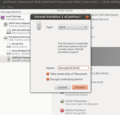 A few weeks ago the Truecrypt project spectacularly imploded and Steve Gibson over at GRC has a good summary of the event. Many people, including me, always liked the idea of Truecrypt being open source but were quite skeptical of the authors being anonymous. Now that they've abandoned their project and also don't want it to be continued by anyone else it's time to think about alternatives.
A few weeks ago the Truecrypt project spectacularly imploded and Steve Gibson over at GRC has a good summary of the event. Many people, including me, always liked the idea of Truecrypt being open source but were quite skeptical of the authors being anonymous. Now that they've abandoned their project and also don't want it to be continued by anyone else it's time to think about alternatives.
Initially I used Truecrypt because there was nothing else available on Windows XP. Then I used it's advantages in cross-platform compatibility to share a file container so I could use my Thunderbird email client on Windows and Linux depending on which machine I used at a time. But I've moved on and I no longer have Windows machines at home. So cross-platform compatibility is no longer necessary.
As a consequence, I've been on the lookout for other options and on Linux, dm-crypt looks like a good alternative. In Ubuntu, and likely also in other Linux distributions, dm-crypt is straight forward to use. When formatting a new hard drive or usb memory stick, Ubuntu's "Disk Utility" offers a simple way to encrypt a new volume with dm-crypt as shown in the image on the left. When the USB stick is later-on plugged-in again, the file manager automatically asks for the password. Perfect! Encrypting hard drives for backups works in a similar way.
So when I recently ran out of space on my backup hard drives and had to buy new ones, I went for dm-crypt instead of Truecrypt. Call it a natural migration away from Truecrypt without much pain as my backup software doesn't care if and how a drive is encrypted. Also, it seems that not too far in the future, my 500 GB notbook SSD needs to get replaced with a 1 TB variant as those virtual machine images just keep growing. A good opportunity to ditch the Truecrypt container I use for especially sensitive data and replace it with a dm-crypt container file or partition.
Speaking of container files: It's also pretty much straight forward with a couple of commands to create and use dm-crypt encrypted container files. Here's a good overview in English and here's one in German.